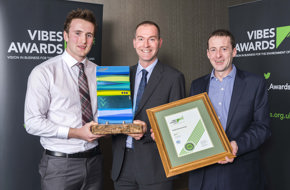Highlights
- Produces safe and reliable disinfection and water treatment which is effective, energy-efficient and affordable.
- Removes risks associated with the transport and use of chemical-based solutions
- Sales performance increased by 70% between 2013 and 2014
- Developed leasing options for kit – opening up opportunities for smaller businesses
- Addresses the key issue of energy supply in rural and remote areas – low energy supply can be achieved through solar PV panels.

Bridge Biotechnology is a manufacturer of low carbon disinfection and ion removal technologies based in Dunfermline that has been testing, developing and commercialising ESOL solutions. Its ESOL technology allows a customer to produce a potent biocide onsite; using salt, water and electricity only. The technology is used in a number of markets including; water disinfection, fruit and vegetable preservation, swimming pool disinfection and biofilm control.
The Hydro Nation Award recognises businesses who have proven expertise in maximising the economic benefit of water resources in Scotland and/or internationally. The judges felt the product was highly innovative and had great potential.
ESOL technology has been developed by Bridge Biotechnology for over fifteen years. This process has involved many small improvements to design, and is now a market leader in producing ESOL using minimal power, salt and water. Bridge began developing a new technology; Capacitive recovery (CRS) in 2013. CRS removes cations and anions by applying an electrical potential difference over two porous carbon electrodes. The need for CRS arose to remove nitrates and ammonia from the water to meet WHO standards.
Bridge Biotechnology is to be commended for their product development and the clear environmental benefits this can bring. Their approach removes some of the risks associated with the transport and use of chemical-based solutions and addresses the key issue of energy supply which in rural and remote areas can be a significant challenge. The salt, water and electricity replace the typically environmentally damaging complex compounds used in traditional disinfectants.
The example of nitrate remediation in Romania; the pilot of their drinking water technology in Pakistan and the use to treat fruit, vegetables and other foodstuffs demonstrate the potential for their innovations to bring significant benefit to the global community.
The manufacturing is done locally where possible and assembly is done on site. During the life of the equipment, parts are returned for pre-planned maintenance and / or refurbishment. They actively promote recycling both internally and amongst their customers and suppliers. A packaging policy is in place that reflects how packaging is designed with waste minimisation principles in mind and how they expect the same of their supply chain. They provide customers with custom made packaging when selling their uniquely shaped products and request the customer reuse that packaging when or if the product is returned.
They have developed strong partnerships with other businesses to deliver the ESOL and CRS systems into a wide range of markets. They are now participating in various sustainability networks which increase the awareness of their products and increases potential for their uptake.
Bridge Biotechnology is committed to having all technologies in their portfolio fall within the company’s ethos of low emissions, few inputs and little waste. They partake in ‘the Green Umbrella’ and ‘Eco Stars fleet recognition scheme’ and have a longstanding company specific environmental policy.
Nick Montgomery, Scientific Liaison Officer at Bridge Biotechnology, said: “Bridge Biotechnology is delighted to receive this recognition for our novel range of sustainable disinfection and purification products, and the environmental ethos we have as a company. VIBES does a fantastic job showcasing upcoming technology and companies, and to win an award among such strong competition is a real honour.”